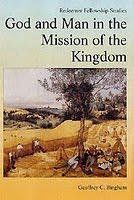(a) The people of God were chosen before time: ‘He chose us in him [Christ] before the foundation of the world’ (Ephesians 1:4); cf. ‘For those whom he foreknew he also predestined’ (Romans 8:29). ‘Us’ in this context must mean ‘the elect people of God’.
(b) The people of God would be holy: ‘He chose us in him [Christ] before the foundation of the world, that we should be holy and blameless before him’ (Ephesians 1:4; cf. Colossians1:22; Hebrews 12:14).
(c) His people are to have salvation: ‘the grace which he gave us in Christ Jesus ages ago [before times eternal]’ (II Timothy 1:9); ‘you were ransomed ... with the precious blood of Christ ... destined before the foundation of the world, but ... made manifest at the end of the times for your sake’ (I Peter 1:18—20).
(d) His people are to be His children, that is. sons: ‘He destined us ... to be his sons through Jesus Christ’ (Ephesians 1:5); cf. ‘our Father, our Redeemer from of old is thy name’ (Isaiah 63:16); ‘my sons ... and my daughters ... whom I created for my glory, whom I formed and made’ (Isaiah 43:6—7; cf. Ephesians 1:4—14).
(e) His people are to have eternal life: ‘God’s elect ... in hope of eternal life which God ... promised ages ago [before times eternal]’ (Titus 1:1—2); ‘name[s] ... written before the foundation of the world in the book of life of the Lamb’ (Revelation 13:8; cf. II Timothy 1:10).
(f) His people are to enter His Kingdom: ‘Come, 0 blessed of my Father, inherit the kingdom prepared for you from the foundation of the world’ (Matthew 25:34); cf. ‘He has delivered us from the dominion of darkness and transferred us to the kingdom of his beloved Son’ (Colossians 1:13).
(g) His people are to be glorified and to glorify God for His grace and His glory: ‘we impart a secret and hidden wisdom ... which God decreed before the ages for our glorification’ (I Corinthians 2:7). This glorification glorifies God: ‘we who first hoped ... have been destined and appointed ... for the praise of his glory ... you also [Gentiles] ... to the praise of his glory’ (Ephesians 1:12—14); ‘my sons ... and my daughters ... whom I created for my glory’ (Isaiah 43:6—7; cf. I John 3:1).
(h) His people are to have an inheritance: as in Abraham to inherit the earth, and the Kingdom of God. (Ephesians 1:14, 18; cf. Ephesians 5:5; I Corinthians 6:9ff.; II Thessalonians 1:5).
(i) The whole Creation will be brought into unity by Christ: ‘a plan for the fullness of time, to unite all things in him, things in heaven and things on earth’ (Ephesians 1:10). Note also ‘filling up’; ‘harmonising’; etc.; Christ ‘who fills all in all’ (Ephesians 1:23); ‘that he might fill all things’ (Ephesians 4:10); ‘reconcile to himself all things whether on earth or in heaven’ (Colossians 1:20); ‘love, which binds everything together in perfect harmony’ (Colossians 3:14).
(j) All evil will be judged and eliminated: ‘But by the same word the heavens and earth that now exist have been stored up for fire, being kept until the day of judgement and destruction of ungodly men’ (II Peter 3:7; cf. Revelation 18—20).










